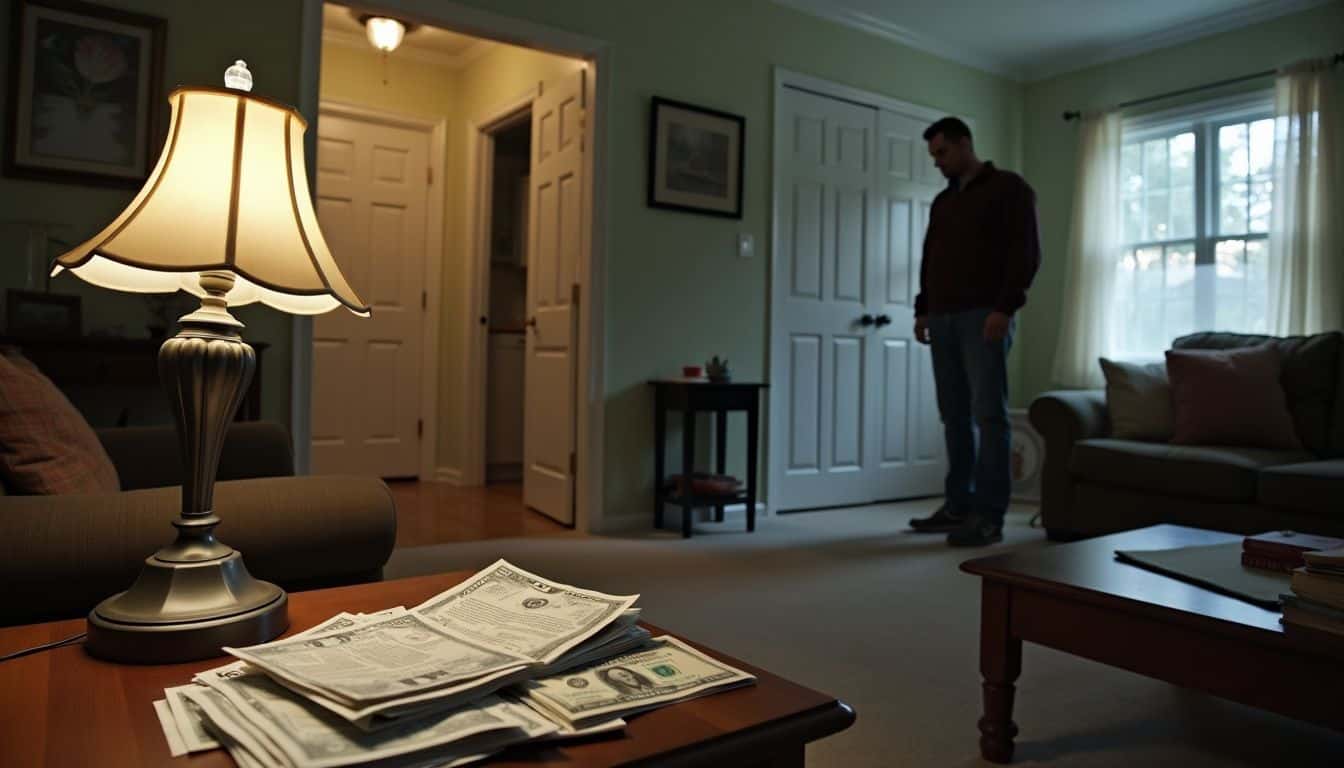Are you tired of asking, “Why does my husband yell at me?” You’re not alone. Many women face this challenge in their marriages. Yelling can lead to feelings of fear and isolation for the person on the receiving end.
This article will shed light on five eye-opening reasons behind your husband’s outbursts and offer practical solutions. Ready to make a change?
Key Takeaways
Husbands may yell due to stress, insecurity, past trauma, substance abuse, or mental health issues. Understanding the root cause can help address the problem.
Constant yelling can deeply harm relationships, causing emotional scars, anxiety, depression, and loss of trust. It may escalate to physical abuse if left unchecked.
Effective communication, setting clear boundaries, and using conflict resolution techniques can help reduce yelling and improve the relationship.
Professional help like couples therapy may be needed if yelling persists. It provides a safe space to work through issues and learn new relationship skills.
Creating a personal safety plan is crucial. Have escape routes, safe places, and emergency contacts ready in case the yelling escalates to dangerous levels.
Table of Contents
Understanding Why Husbands May Yell

Yelling isn’t just about anger. It’s often a sign of deeper issues – stress, insecurity, or past hurts. Let’s dig into why husbands might raise their voices and how to handle it.
Addressing Stress and External Pressures

Life throws curveballs. Jobs, money troubles, and family drama can pile up fast. These outside stressors often seep into our homes, causing tempers to flare. Your husband might snap over small things when he’s really upset about work or bills.
https://www.youtube.com/watch?v=m7zfJCW9Yco
Chronic stress messes with our emotions. It’s like a pressure cooker ready to blow. Your partner may struggle to keep his cool when life gets tough. But yelling isn’t the answer. Learning to handle stress together is key.
Talk openly about what’s bugging you both. Find ways to relax and unwind as a team. If things get too heated, a divorce lawyer can help sort out legal options.
You deserve respect, no matter what’s going on outside your home.
Stress acts like a boiling pot of water. If you don’t release the steam, it’ll eventually explode.
Exploring Insecurity and Emotional Challenges

Insecurity can be a big reason why husbands yell. It’s like a hidden monster that makes them feel small inside. Maybe they’re scared of not being good enough or losing control. These fears can turn into loud words and angry outbursts.
Emotional challenges play a part too. Some men struggle to handle tough feelings like sadness or worry. Instead of talking it out, they let it build up until it explodes.
Past hurts can also fuel yelling. If a man grew up in a home with lots of shouting, he might think it’s normal. Or maybe he’s dealing with trauma that makes him jumpy and quick to anger.
It’s not an excuse, but it helps explain why some guys lash out. The good news? With help and hard work, men can learn better ways to cope. They can swap yelling for talking and turn fear into trust.
Impact of Past Traumas and Attachment Issues

Past hurts can leave deep scars. These old wounds may cause your husband to lash out. Trauma shapes how we handle stress and show love. It’s like an invisible backpack of pain he carries around.
This baggage can make him react badly when he feels threatened or scared.
Attachment issues play a big role too. How we bonded with our parents as kids affects our adult relationships. If your husband didn’t feel safe or loved growing up, he might struggle to trust now.
This fear can come out as anger or yelling when he’s feeling insecure. It’s not an excuse, but understanding these roots can help you both heal and grow together.
Recognizing Substance Use and Mental Health Concerns

Moving from past traumas, let’s talk about another big issue: drugs, booze, and mental health. These can really mess with a marriage. Substance abuse messes up impulse control. This means your hubby might yell more when he’s drunk or high.
It’s not okay, but it happens.
Mental health problems can make things worse too. Depression, anxiety, or other issues can lead to more outbursts. If your man is struggling with these, he might lash out more. It’s not an excuse, but it helps explain things.
Keep an eye out for signs of substance abuse or mental health issues. They could be at the root of the yelling problem. Getting help for these issues could make a big difference in your relationship.
Examining the Impact of Yelling in Relationships

Yelling can leave deep scars on a relationship. It chips away at trust and respect… Want to know more about how shouting affects you and your partner? Keep reading!
Exploring Emotional and Psychological Effects

Yelling in a marriage can leave deep scars. It chips away at your self-worth, bit by bit. You might start to doubt yourself or feel anxious all the time. Some women even develop depression or PTSD from constant verbal attacks.
It’s like walking on eggshells in your own home. You never know what might set off the next explosion.
Trust takes a big hit too. How can you open up to someone who might blow up at any moment? The whole family suffers in this toxic environment. Kids learn unhealthy ways to deal with conflict.
Your home should be a safe haven, not a war zone. If your husband has hurt you emotionally, it’s crucial to address it.
Don’t let the yelling continue unchecked. Your mental health matters.
The scars from mental cruelty can be as deep and long-lasting as wounds from punches or slaps, but are often not as obvious. – Lundy Bancroft
Assessing the Risk of Escalation to Abuse

Yelling can be a red flag for worse things to come. It’s often the first step in a scary pattern. Angry outbursts may lead to pushing, hitting, or other physical harm. This risk goes up when yelling happens a lot.
Victims might start to walk on eggshells, always trying to keep the peace. They may change who they are just to avoid setting off their partner.
Stress from outside can make things worse. But at its core, this behavior is about power. The yeller wants control. They use fear to get their way. It’s a slippery slope that can turn ugly fast.
If you’re dealing with this, know it’s not your fault. You deserve to feel safe in your own home. Let’s look at some ways to handle conflict better and keep things from getting out of hand.
Strategies to Mitigate Yelling

Let’s talk about ways to stop the yelling. There are some smart tricks you can use to cool things down. Want to know more? Keep reading!
Promoting Effective Communication

Good communication can stop shouting in its tracks. It’s all about speaking clearly and listening well. Try using “I” statements to share your feelings without blame. For example, say “I feel hurt when you raise your voice” instead of “You always shout at me.” This helps your husband understand your perspective without getting defensive.
Active listening is important too. Give your full attention, nod, and repeat back what you heard. This shows you care and helps avoid misunderstandings that lead to shouting.
Setting up a “quiet space” in your home can be really helpful. It’s a special spot where you both agree to talk things out calmly. No shouting allowed! Use this space to take breaks after arguments.
Take a moment, calm down, then come back to chat. If your husband never says anything nice about you, it might be time to have an honest conversation about how that makes you feel.
Open, sincere talks can help fix many relationship issues.
Implementing Clear Boundaries
Clear boundaries are essential for a healthy marriage. They help prevent shouting and maintain respect. Set guidelines for communication during disagreements. Perhaps agree to pause if voices get too loud.
Or decide that insults are not allowed. Explain to your husband how his shouting affects you and the children. Be firm yet kind when discussing your limits.
“Good fences make good neighbors, and clear boundaries make happy marriages.”
Stay committed to the boundaries you’ve established. If your husband shouts, calmly remind him of the guidelines. Then take a break if necessary. Don’t give in to pressure or guilt.
Effective boundaries require practice, but they’re valuable. They can transform a noisy household into a tranquil home. You deserve to feel safe and heard in your own home.
Applying Conflict Resolution Techniques
Conflict resolution is straightforward. It’s about talking things out calmly. First, take a deep breath. Then, use “I” statements to share your feelings. “I feel hurt when you yell” works better than “You’re always yelling!” Listen to your partner, too.
Really hear them out. Try to see things from their perspective. It’s not about winning – it’s about finding a solution together.
Sometimes, a break helps cool things down. Agree on a signal, like a timeout hand gesture. Use it when emotions run high. Come back when you’re both calmer. Then, brainstorm solutions together.
Pick one that works for both of you. Keep in mind, practice improves skills. The more you use these techniques, the easier they’ll become. Soon, you’ll be solving conflicts effectively!
Recognizing the Need for Professional Intervention

Sometimes, yelling becomes too much to handle alone. A pro can help you and your husband find better ways to talk and solve problems.
Identifying Signs for Counseling
Arguments in marriages often indicate a need for counseling. Be aware of blame shifting – if your husband consistently attributes his anger to you, it’s concerning. Intimidating behavior is another serious issue.
These actions create an atmosphere of fear and mistrust at home. No one should feel constantly on edge.
Pay attention to these indicators. If arguments persist, consider professional help. A skilled therapist can address marital dissatisfaction. They’ll also help with any underlying mental health concerns that might be contributing to the situation.
Seeking support shows strength – not weakness. You deserve a harmonious, loving home environment.
Exploring the Benefits of Couples Therapy
Couples therapy offers a safe space to tackle tough issues. It’s like a gym for your relationship, where you both work out the kinks. A skilled therapist guides you through talks and tasks.
They help you see things from new angles. You’ll learn to listen better and speak your mind clearly. This can lead to deeper trust and closeness.
Many couples find therapy eye-opening. It’s not just about fixing problems. It’s about growing together. You might discover hidden strengths in your bond. Or uncover old hurts that need healing.
The process can be hard but rewarding. It’s a chance to build a stronger, happier future as a team. Plus, the skills you learn can help in all areas of life.
Prioritizing Self-Care and Safety

Taking care of yourself is key when dealing with a yelling husband. It’s not selfish – it’s smart. You need to be strong to handle tough times and make good choices.
Emphasizing the Importance of Self-Soothing Techniques
Self-soothing is a game-changer for keeping your cool. It’s like having a secret weapon to calm your nerves when life gets crazy. Imagine having a toolkit full of tricks to help you chill out – that’s what self-soothing is all about.
Studies show these techniques can slash stress levels big time. It’s not rocket science either – simple stuff like deep breaths, a warm bath, or hugging a soft pillow can work wonders.
Your five senses are key players in self-soothing. Try lighting a scented candle, listening to your favorite tunes, or sipping some herbal tea. Mindfulness practices like meditation are also top-notch for finding your zen.
The best part? You can mix and match these tricks to find what works best for you. It’s all about giving yourself a little TLC when you need it most.
Creating a Personal Safety Plan
Self-soothing can help, but safety comes first. A personal safety plan is your lifeline. It’s a step-by-step guide for tough times. You’ll map out safe spots in your home and outside.
Think about rooms with easy exits or places where you can lock the door. List trusted friends or family who can help in a pinch. Keep important docs, cash, and a packed bag ready. Know the fastest way out of your house.
Have a code word with your kids or neighbors. This plan isn’t just a piece of paper – it’s your shield. It gives you power when you feel powerless. Your safety matters most. Don’t wait to make your plan.
Start now, update often, and stay ready.
People Also Ask
Is yelling a sign of emotional abuse?
Yelling can be a red flag for emotional abuse. It’s not just about raised voices. It’s about control and fear. If your husband’s yelling leaves you feeling small or scared, it’s time to talk. Don’t brush it off. Your emotional health matters.
How can stress lead to yelling in a marriage?
Stress is a beast. It can turn anyone into a yeller. Maybe your husband is sleep-deprived or overwhelmed. His limbic system might be in overdrive, triggering that fight-or-flight response. But stress isn’t an excuse for mistreatment. Coping skills and anger management can help tame the stress monster.
What role does poor communication play in a yelling husband?
Communication breakdowns are relationship killers. If your husband lacks the tools to express himself, he might resort to yelling. It’s like trying to hammer a nail with a screwdriver. All wrong. Learning better communication skills can be a game-changer. It’s not rocket science, but it takes work.
Could underlying mental health issues cause frequent yelling?
Sometimes, yelling is just the tip of the iceberg. Mood swings, anger issues, or even disorders like bipolar disorder could be lurking beneath. If your husband’s yelling seems out of character, a chat with a health professional might be eye-opening. Mental health isn’t a walk in the park, but help is out there.
How does resentment contribute to a husband’s yelling?
Resentment is like a slow-growing weed. It starts small but can choke a relationship. If your husband feels unappreciated or stuck in outdated gender roles, yelling might be his way of lashing out. Tackling resentment head-on can clear the air. It’s not easy, but it beats living with a powder keg.
What can I do if my husband’s yelling turns into bullying or physical violence?
If yelling escalates to bullying or violence, it’s time to hit the brakes. Your safety comes first. Reach out to women’s shelters or a social worker. They’re not just there for show. They can offer real help and support. Remember, you’re not alone, and you don’t deserve mistreatment. Stand tall and seek help.
References
https://www.enotalone.com/article/marriage/why-is-my-husband-yelling-heres-how-you-can-fix-it-r15901/ (2024-09-16)
https://www.gottman.com/blog/why-is-my-husband-yelling-at-me/ (2024-07-15)
https://wellbeingscounselling.ca/my-husband-yells-at-me/
https://www.ncbi.nlm.nih.gov/books/NBK207191/
https://sa1s3.patientpop.com/assets/docs/85477.pdf
https://www.marriage.com/advice/relationship/psychological-effects-of-yelling-in-relationship/ (2023-08-14)
https://www.goodtherapy.org/blog/yelling/
https://hagarssisters.org/why-does-my-husband-yell-at-me/
https://thewell.northwell.edu/relationships-sexual-health/yelling-relationships-damage
https://www.momjunction.com/articles/reasons-my-husband-yells-at-me_001050070/
https://www.choosingtherapy.com/my-husband-yells-at-me/ (2023-07-12)
https://www.ncbi.nlm.nih.gov/pmc/articles/PMC9439588/
https://positivepsychology.com/self-soothing/ (2022-01-21)
